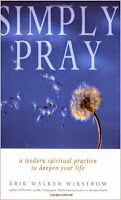I've already written at some length about the problematic images many people have of "God," and how, when they reach a point of deciding that they can't believe in those images anymore, they close their eyes, minds, and hearts to any idea of "God" at all. The same is often true with "prayer" as well. Over the years I've talked with a great many people who've told me, essentially, "I was taught what prayer is. What I was taught no longer makes sense to me. Therefore, prayer no longer makes sense to me, and I don't 'believe' in it."
Yet even when a person discovers a new way of understanding what the word "God" might point to, the (let's call it) indoctrination on the subject of prayer is often extremely deeply rooted. We don't know what to do with talk about prayer if the "God" we've come to understand is not that "God."
The 19th century historian, philosopher, and author Ernest Ranan offered one way of making a transition to a new understanding with what's come to be known as The Prayer of the Agnostic:
O God, if there is a God, save my soul, if I have a soul.Others have suggested that we could see prayer not so much as talking to someone else, and more as talking to ourselves. We could think of it as making us more conscious about, for instance, the needs of of another person, or our gratitude for the gifts we've been given. Prayer is, then, not a means for making sure that some external "God" knows something. This understanding of prayer is about making sure that we know it.
You could also think of payer as an exercise of our creative, spiritual imagination. Those of us with pets talk to them all the time, yet we know that they can't really understand what we're saying. Yet we essentially "pretend" that they can. (Those of us with adolescent children often pretend that they are listening, too!) We can think of prayer this way as well -- we can personify that "Sacred Something" and talk as if "it" can understand us.
This is not as ridiculous as it might seem. Dreams aren't "real," as we usually define reality, yet often we can find in our dreams' imagery important insights that do effect our "real" lives. And using the pet metaphor, many people can tel stories of how talking to their pet has helped them to work through a difficult decision or discover something they hadn't known.
 In 2005 Skinner House Books published Simply Pray: a modern spiritual practice to deepen your life. In the next several posts I'll summarize some of what I cover in that book about the nature of prayer, and a practice which many have told me has been very powerful, whatever their beliefs might be.
In 2005 Skinner House Books published Simply Pray: a modern spiritual practice to deepen your life. In the next several posts I'll summarize some of what I cover in that book about the nature of prayer, and a practice which many have told me has been very powerful, whatever their beliefs might be.Paxt tecum,
RevWik


